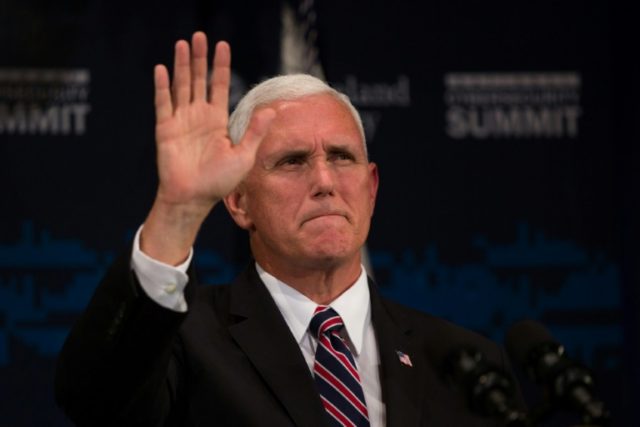China’s Foreign Ministry on Friday lashed out against U.S. Vice President Mike Pence for a speech on Thursday evening in which he accused the Chinese of stealing technology, co-opting U.S. tech companies into censorship campaigns, and interfering in American politics.
Pence spoke at the Hudson Institute on Thursday, accusing China of “pursuing a comprehensive and coordinated campaign to undermine support for the President, our agenda, and our nation’s most cherished ideals.”
Pence called on Google to terminate development of a surveillance-friendly search engine called “Dragonfly,” which he said would “strengthen Communist Party censorship and compromise the privacy of Chinese customers.”
He further advised U.S. tech companies to avoid doing business with China “if it means turning over their intellectual property or abetting Beijing’s oppression.”
The Chinese Foreign Ministry took strong exception to every key element of Pence’s speech.
“The relevant speech made unwarranted accusations against China’s domestic and foreign policies and slandered China by claiming that China meddles in U.S. internal affairs and elections. This is nothing but speaking on hearsay evidence, confusing right and wrong and creating something out of thin air,” Foreign Ministry spokesman Hua Chunying said on Friday.
“It is very ridiculous for the U.S. side to stigmatize its normal exchanges and cooperation with China as China interfering in its internal affairs and elections,” she added. “The international community has already known fully well who wantonly infringes upon others’ sovereignty, interferes in others’ internal affairs and undermines others’ interests.”
“We urge the U.S. side to correct its wrongdoing, stop groundlessly accusing and slandering China and harming China’s interests and China-U.S. ties, and take concrete actions to maintain the sound and steady development of China-U.S. relations,” Hua concluded.
The New York Times on Friday saw China as stunned by the “magnitude of alleged offenses” in Pence’s speech and his pugnacious “we will not stand down” attitude.
In fact, the Times saw Pence’s remarks as nothing less than the beginning of a new Cold War, which would place it on the same historic shelf as Sir Winston Churchill’s “Iron Curtain” speech at the beginning of the Cold War with the Soviet Union. Remarks to a think tank would not be an inauspicious venue for such a speech; Churchill was addressing Westminster College in Missouri when he delivered his. Some commenters on China’s heavily censored social media explicitly compared Pence’s speech to Churchill’s, but not in a complementary manner.
Democrats in America who have been eager to crank up the old Cold War against Russia ever since Hillary Clinton’s defeat in 2016 were not happy to see Pence shift the focus to Chinese election interference.
“The vice president attempted to shift public scrutiny from Russia to China. He asserted that Russian efforts to interfere in America’s electoral process ‘pales in comparison to what China is doing,’” former Obama administration official Ryan Hass, now with the Brookings Institution, complained to the New York Times.
Beijing will be pleased to see the Washington Post utterly beside itself on Friday, railing against Pence for his “complicity in downplaying Russian election interference” and accusing the Trump White House of manufacturing complaints against China to distract from the seemingly endless investigation into alleged Russian meddling in 2016.
The Post granted that the Trump administration might be sitting on intelligence about Chinese influence efforts that it has not yet shared with the public and conceded that China “employs aggressive influence campaigns,” but castigated Pence anyway for comparing whatever China is doing to whatever Russia did with troll farms and social media posts in 2016.
There is an interesting discussion to be had about just how much influence authoritarian foreign governments should be allowed to purchase in democratic societies, and if there is any way to stop them consistent with free speech principles, or if it is even possible to stop them in an era of global online media. The L.A. Times touched on that discussion Thursday:
“Many of these things are China trying to get its points across. And for some, it’s interference in the U.S. politics. But for others it’s simply China stating its views,” said David Bachman, a China scholar at the University of Washington in Seattle.
Pence described the Chinese actions as a “comprehensive and coordinated campaign,” saying that “Beijing is employing a whole-of-government approach, using political, economic and military tools, as well as propaganda, to advance its influence and benefit its interests in the United States.”
Bachman said it appeared that Pence’s speech was foreshadowing “a whole-of-government response from the United States, so it looks like the relationship is going to continue to deteriorate.”
One big difference between Churchill’s Iron Curtain speech and Pence’s remarks on Thursday is that Pence held out hope the new Cold War could still be avoided. “We will not relent unless our relationship with China is founded on fairness, reciprocity, and respect for our sovereignty,” he said.
China insists it wants all of those things as well and bristles at accusations to the contrary. There is still room for negotiation between the two great powers of the modern world, but it’s dwindling fast.

COMMENTS
Please let us know if you're having issues with commenting.